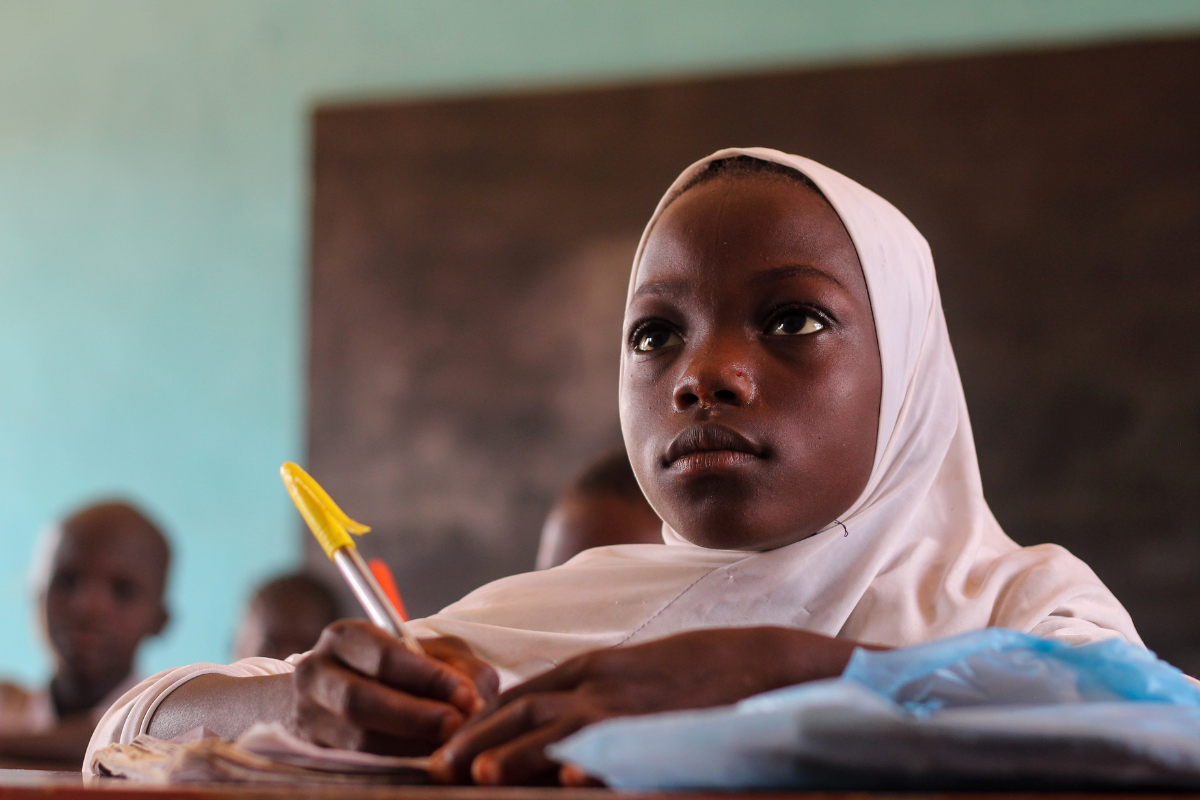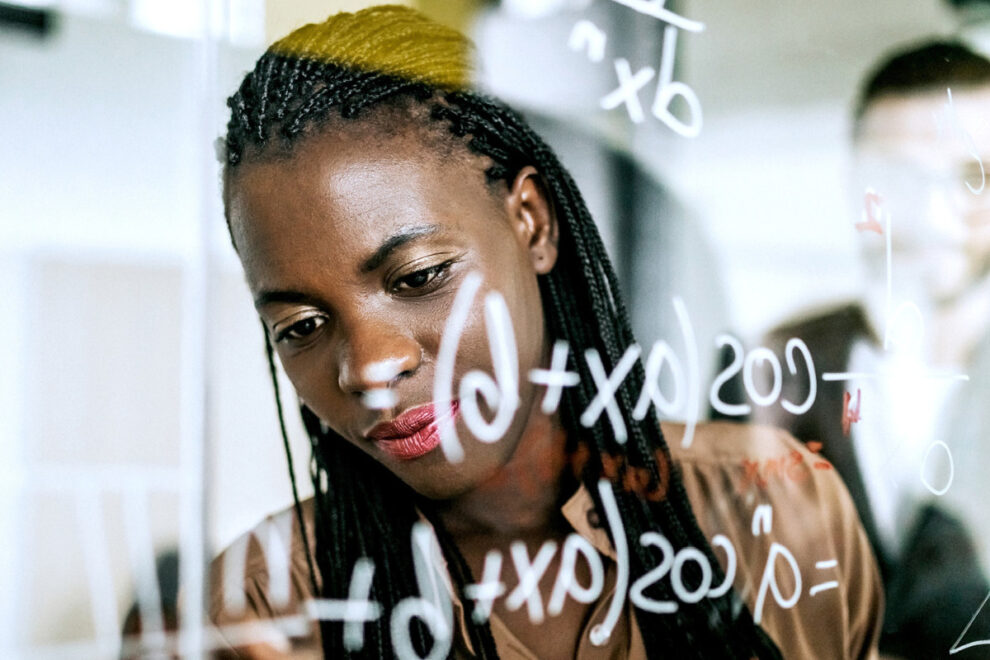Seven visionary scientists and entrepreneurs are driving innovation and positive change across the continent’s technology sectors.
The chronic shortage of skilled science, technology, engineering and mathematics (STEM) researchers throughout Africa is set to cause serious problems as the continent struggles to keep pace with the surge in AI, cloud computing and automation that’s transforming industries throughout the world.
Delegates at the fifth African Science, Technology and Innovation Forum in Niger in February were given a stark warning by Habi Mahamadou, the country’s Minister for Secondary and Higher Education, Research and Technology, that the situation was already dire and could have catastrophic consequences for already vulnerable economies if companies can’t compete on the world stage.
UNESCO agrees, declaring recently that the lack of skilled STEM graduates in sub-Saharan nations required urgent action otherwise development goals would be squandered.
It’s one of several agencies and industry bodies that have identified one rather obvious solution: empowering young women into the male-dominated sector to become the changemakers of the future.
Currently, it says females have to contend with discrimination, family responsibilities and deeply entrenched beliefs about a woman’s role, meaning that committing to years of training and research is often impossible.

Changing Gender Roles
According to the Mastercard Index of Women Entrepreneurs, only a quarter of new business owners in Africa are female. In STEM, the percentage is lower still and lagging behind developing nations in Asia, the Caribbean and south-east Europe.
However, a growing number of outliers are demonstrating that traditional gender roles can change.
- South Africa and Mauritius have both achieved gender equality in technology.
- Senegal has tripled its share of women in the field to a third since 2006.
- Lesotho and Namibia both have more women than men studying science.
- In Togo, 70 percent of senior tech roles are held by females, the highest such figure in the world.
A powerful group of female changemakers are challenging attitudes and giving a new generation of girls a chance to help put Africa on the STEM map. Here are seven whose work has already had a seismic impact.
Ohemaa Adjei Andoh, Ghana
Advocating for Girls in Tech
A former women’s commissioner and Women in Engineering President at Kwame Nkrumah University, Andoh has pioneered new processes in oil and gas exploration and spent much of her career sharing her passion for science with young girls.
“STEM is fun. It’s the basis of our very existence,” she tells The CEO Magazine.
“My teachers advised me to pursue engineering as I liked hands-on activities and was always coming up with new ways to solve problems. Now I want girls to know the endless opportunities out there.”
In 2018, she founded Girls in Science and Technology (GIST), an organization run by a group of STEM professionals that facilitates mentoring, coaching and internships, providing openings that might otherwise be denied. It also arranges sponsorships for girls from less privileged backgrounds.
“I want girls to know the endless opportunities out there.” – Ohemaa Adjei Andoh
Andoh had the idea when she was the only woman among 150 men on an oil rig off the coast of Nigeria.
“I’ve encountered prejudice and sexism a few times. When I resumed my offshore duties after childbirth, a male colleague questioned why I’d leave my child to come work,” she recalls.
GIST has already inspired hundreds of young girls to take subjects where they’re outnumbered – for now – by boys.
“It showcases Ghanaian women doing amazing work and has motivated a lot of girls to pursue STEM careers,” she reveals.
“I want people to be the best versions of themselves. I want them to explore the world of STEM and have the opportunity to shine their light.”

Sherien Elagroudy, Egypt
Recycling Warrior
Elagroudy’s desire to drive meaningful change first manifested itself when she realized Ain Shams University in Cairo didn’t have a proper recycling program.
She was studying civil engineering as an undergraduate there and immediately helped form a group to start a campus-wide program to stop plastic bottles, cans and paper from ending up in landfill.
The scheme ended up causing tons of reusable materials to be successfully recycled, winning her the Best Young Scientist Award at Ain Shams University – the first of many accolades – and spurring her into the field of hazardous waste management, sewage treatment and wastewater networks.
“Africa is facing major challenges, but science could have solutions – if we invest in it.” – Sherien Elagroudy
She transformed the way bio-reactor landfills are managed by building a field-scale prototype that emitted no methane nor waste products into Cairo’s water supply.
Since then, she’s spent 16 years developing sustainable waste treatments and, as Associate Professor of Environmental Engineering at her alma mater, encouraging the next generation of engineers to think big and improve their country.
Elagroudy’s groundbreaking work saw her awarded a Young Scientist trophy at the World Economic Forum in China and a L’Oréal UNESCO Fellowship for Women in Science, as well as being named a Next Einstein Forum Fellow.
“Africa is facing major challenges, but science could have solutions – if we invest in it,” she points out. “A problem that faces R&D is that research priorities are set outside the continent without any alignment to the needs.”
Rebecca Enonchong, Cameroon
Unleashing Entrepreneurial Zeal
Named one of the 100 Most Influential Africans in Science, Tech and Innovation by New African Magazine and among Jeune Afrique’s 50 Most Influential Africans, Enonchong is helping to define Africa’s scientific future and fueling women-led tech businesses in more than 50 African nations.
She chairs ActivSpaces, the African Center for Technology Innovation and Ventures, the first privately started tech hub in Cameroon, which supports young entrepreneurs on their startup journeys.
“The mind of a Black African woman wasn’t worth as much as that of a white male, so I usually had to hide behind the business as it was difficult for people to accept it was my company.” – Rebecca Enonchong
She’s also the Founder and CEO of AppsTech, which advises emerging small companies on how to scale up, adopt new software and become resilient.
Enonchong’s desire to unleash the potential of young people just starting out in their careers stems from her own difficult experiences when she was attempting to do the same.
“The mind of a Black African woman wasn’t worth as much as that of a white male, so I usually had to hide behind the business as it was difficult for people to accept it was my company,” she tells The CEO Magazine.
“When I was with male colleagues, I’d simply be ignored, and when I tried to open a bank account, I wasn’t allowed inside and was told the bank was for commercial accounts only as they’d just assumed I wouldn’t have a business.”
She also spent four years chairing Afrilabs, an entrepreneurial support network that now extends to 1.5 million businesses in 52 African countries.
“Last year alone it provided over US$600,000 in funds, a number we aim to triple this year,” she confirms.
Francisca Nneka Okeke, Nigeria
A Devotion to Physics
One of the world’s most pre-eminent ionospheric geophysicists, Okeke has devoted most of her career to studying the Equatorial Electrojet, a band of current that flows across the area either side of the equator.
Her work is helping our understanding of climate change and ways to better predict natural disasters such as tsunamis and earthquakes, winning her a UNESCO Women in Science award and a place in New African Magazine’s list of Top 100 Most Influential Africans.
“My childhood curiosity is the key to my remarkable achievements and my passion for science.” – Francisca Nneka Okeke
Equally significant has been her work on gender equality and championing girls who study STEM. Her obsession began very early.
“My childhood curiosity is the key to my remarkable achievements and my passion for science,” Okeke says. “As a little girl, I was fascinated by the sky; why it appears white at times and blue at other times. I wondered why airplanes could fly and found my vocation when I learned physics could answer my questions.”
It also provided her with a husband at 18 when she married an eminent physicist, who encouraged her ambitions at a time when female academics were often shunned.
She was the first woman head of a university physics and astronomy department, and the first to be made a dean.
“In the past, core sciences such as physics were regarded as male domains where women were expected to be seen but not heard,” she says.
“People used to think that when you get into these subjects, the characteristics that are most worthily accepted for women including passivity, emotionality, intuition and receptivity would no longer be possessed by that woman.”

Quarraisha Abdool Karim, South Africa
AIDS Game-Changer
Few have played a bigger role in expanding South Africa’s scientific community than the tireless epidemiologist and AIDS researcher, who has also been front and center of the country’s response to the COVID-19 pandemic.
Abdool Karim has campaigned for women-led technologies and more female representation in major research fields. She’s personally overseen the training of 600 scientists.
“For most of my life I thought about science and its application to leaving people better off, so I wanted to be a scientist and do something that would help people,” she explains.
“The vulnerability of young women is very much tied into gender power differences in society.” – Quarraisha Abdool Karim
Abdool Karim’s 32 years of studying HIV has yielded numerous major breakthroughs that have improved treatments and survival rates internationally, winning her countless awards, including the Order of Mapungubwe, South Africa’s highest honor. In 2017, the BBC named her as one of the all-time seven most trailblazing women in science.
“The vulnerability of young women is very much tied into gender power differences in society,” she says.
“[Women] continue to inspire me to persist with my scientific endeavors. While some progress has been made, much more remains to be done to ensure a non-sexist and just society.”
Neema Iyer, Uganda
Empowering Women in Tech
Founder of Pollicy, a feminist technology collective focusing on how STEM disciplines can create social change and revitalize African societies, Iyer has been a trailblazer for ethical digitalization in a nation where two-thirds of the population remain offline.
Pollicy’s annual DataFest Kampala brings together data engineers and business leaders to shape Uganda’s IT culture and widen online access.
Such is her influence that Meta appointed her to its Global Women’s Safety Advisory Board, where she helped produce the ‘Afrofeminist Data Futures’ report on how Facebook’s data could help women across the continent.
“We all hold pieces of knowledge that can be instrumental in designing a better future.” – Neema Iyer
“Some of my proudest moments in STEM have been around conducting vital research on our technological and data ecosystems to put our needs, challenges and solutions on the map,” she tells The CEO Magazine.
Iyer’s recent research has included understanding the safety and usability of non-majority languages online and the role of feminist data governance and digital justice.
“Technological advancements are rapid and measuring impact is complex, but we approach the solution by engaging with a diverse range of stakeholders such as technologists, media professionals, political leaders, students, feminist organizations and rural communities. We all hold pieces of knowledge that can be instrumental in designing a better future,” she stresses.

Rachel Sibande, Malawi
Nurturing Tech Startups
A campaigning computer scientist and cryptologist, Sibande was named one of Africa’s 30 most promising entrepreneurs under 30 in 2016 after founding mHub, an incubator for tech startups, particularly those led by women.
In its first five years, it provided more than US$1 million to back emerging businesses, created 950 jobs and trained 42,000 young people across five countries. Its profits are channeled into social initiatives, including teaching coding to children.
Sibande was inspired to launch the program after being selected to join President Obama’s Young African Leaders Initiative.
“Our goal is to build a generation of young people who have problem-solving skills and are exposed to technology so they can consider a career in tech.” – Rachel Sibande
“My parents supported me to pursue whatever field I wanted and raised me with the mentality that girls could do anything just as well as boys,” she reveals.
“For someone like me who wanted to do something different in the technology domain, I didn’t have many role models I could look up to. I think this is why I’m so passionate about mentoring young girls.”
Two such girls trained by mHub won the chance to enter a robotics competition in the United States where they demonstrated a revolutionary robot that could separate clean and dirty water.
Another participant, a 10-year-old boy, built an app that translates text into speech to teach coding to kids, and won a competition to meet a suitably impressed Mark Zuckerberg.
“Our goal is to build a generation of young people who have problem-solving skills and are exposed to technology so they can consider a career in tech,” she explains.
An Emerging Powerhouse
In Africa, changemakers typically have fewer resources at their disposal than a Californian Harvard graduate with family connections to a dozen private equity firms.
They must labor tirelessly to gain access to investors and then fight the inherent prejudice that the entire continent faces when it comes to being taken seriously as an emerging STEM powerhouse.
For African women, cultural legacies and misogyny put further barriers along the path to success. But in STEM, the tide is gradually turning.
The United Nations reported that sub-Saharan Africa now boasts the world’s highest rate of female entrepreneurs, with more inspirational women than ever becoming changemakers for a continent with ambitious plans to be at the heart of the digital revolution.
Source : CEO Magazine















